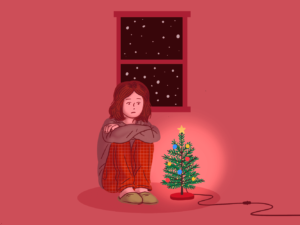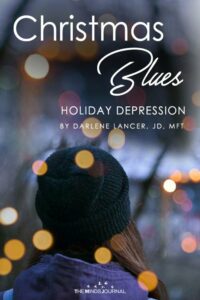Christmas is a time for celebration. But for some people, it can be a difficult time. If you are feeling sad, anxious, or overwhelmed during the Christmas season, you may be experiencing Christmas blues sadness. In this blog post, we will discuss the symptoms, causes, and treatment of Christmas blues sadness.
Contents
Understanding Christmas Blues Sadness

Christmas blue sadness is a feeling of sadness, anxiety, or depression that can occur during the holiday season. It is estimated that up to one in every six people experience Christmas blues sadness.
Christmas BlueSadness Vs. Seasonal Affective Disorder
It is important to distinguish between Christmas blue sadness and seasonal affective disorder (SAD).
SAD is a type of clinical depression that occurs at the same time every year. It typically begins in the fall and continues through the winter months.
While SAD can be debilitating, it is important to remember that Christmas blues sadness is not as serious or long-lasting.
Types of Christmas Blues Sadness
There are three types of Christmas blue sadness:
Situational Christmas blues sadness: It is the most common type of Christmas blue sadness. It occurs when a person’s expectations for the holiday are not met. For example, if you expect to have a happy and joyous holiday season but instead experience stress and anxiety, you may be experiencing situational Christmas blues sadness.
Reactive Christmas blue sadness: It occurs in response to a stressful event that happens during the holiday season. For example, if you experience the death of a loved one or a job loss during the holidays, you may be experiencing reactive Christmas blues sadness.
Persistent Christmas blues sadness: It is more severe and long-lasting than situational or reactive Christmas blue sadness. It occurs when a person experiences symptoms of depression, anxiety, or stress that persist throughout the holiday season.
Symptoms of Christmas Blues Sadness
Christmas blue sadness can cause a variety of physical and emotional symptoms, including:
- Irritability or short temper
- Tiredness or lack of energy
- Poor appetite or overeating
- Weight gain or weight loss
- Thoughts of suicide or death
- Difficulty sleeping or concentrating
- Feeling sad, anxious, or overwhelmed
- Feelings of hopelessness or worthlessness
- Loss of interest in activities you usually enjoy
Causes of Christmas Blues Sadness
Several factors can contribute to Christmas blues sadness. These include:
Social factors: The pressure to spend time with family and friends can be a source of stress for some people. This is especially true if you have strained relationships with your family members.
Biological factors: Changes in the levels of certain hormones, such as serotonin, during the winter months can contribute to feelings of sadness or depression.
Environmental factors: Limited daylight, colder temperatures, and increased levels of holiday-related stress can all contribute to Christmas blues sadness.
Psychological factors: Memories of holidays, unrealistic expectations for the holiday season, changes in routine, and feelings of loneliness or isolation can all trigger Christmas blues sadness.
Financial factors: The holiday season can be a financial strain for many people. The pressure to spend money on gifts or travel to go into debt can be a source of stress for some people.
Risk Factors of Christmas Blues Sadness
Several risk factors may increase your risk of Christmas blues sadness. These include:
Being a woman: Women are more likely than men to experience Christmas blue sadness.
Loneliness: The holiday season can be a difficult time for people who are lonely or isolated. If you don’t have close friends or family to spend the holidays with, you may feel blue during this time of year.
Being single: If you are single, you may be more likely to experience Christmas blues sadness. This is because you may not have a partner to share the holiday season with.
Being a caregiver: If you are a caregiver for someone, you may be more likely to experience Christmas blue sadness. This is because caregivers often have a lot of responsibility and stress in their lives.
Having a history of depression or anxiety: If you have a history of depression or anxiety, you may be more likely to experience Christmas blue sadness.
Coping With Christmas Blues Sadness

If you are experiencing the symptoms of Christmas blues sadness, there are several things that you can do to help cope with them. These include:
Self-help Tips
Take care of yourself: Get plenty of rest, eat healthy foods, and exercise regularly.
Put limits on your holiday obligations: Say no to events or activities that you don’t want to attend.
Seek support from friends and family: Talk to the people close to you about how you are feeling.
Connect with others online: Join a Christmas-themed discussion forum or chat room, or participate in online holiday activities.
Self-help Tools
There are several self-help tools that you can use to help cope with Christmas blues sadness. These include:
Christmas music: Listening to Christmas music can help you feel more festive and upbeat.
Watch Christmas movies: Watching Christmas movies can help you feel more connected to the holiday season.
Christmas lights: Looking at Christmas lights can help lift your mood and increase your feeling of happiness.
Blogging: Writing about your experiences can be a great way to process your thoughts and feelings. It can also help you connect with others who are going through similar experiences.
Online forums and chat rooms: There are several online forums and chat rooms where you can connect with others who are experiencing the same feelings as you. This can be a great way to share tips and support each other.
Self-help Techniques
There are several self-help techniques that you can use to help cope with Christmas blues sadness. These include:
Relaxation techniques: Relaxation techniques, such as deep breathing and progressive muscle relaxation, can help you to feel more relaxed and calm.
Guided imagery: Guided imagery is a type of self-help tool that involves listening to calming music and imagining yourself in a peaceful, relaxing setting. This can help you to feel more relaxed and calm.
Journaling: Journaling can be a great way to express your thoughts and feelings about the holiday season. It can also help you to identify any patterns or triggers that may be causing your Christmas blues sadness.
Stress management: Stress management techniques, such as time management and problem-solving, can help you to better cope with the stress of the holiday season.
Talking To Professional
If you are experiencing symptoms of Christmas blues sadness that are causing significant distress or impairment in your life, it may be helpful to talk to a professional.
A professional can provide you with support and guidance and can help you to develop a plan to cope with the holiday season. If necessary, they may also recommend medication or therapy.
Therapy
If you are struggling to cope with the symptoms of Christmas blues sadness, you may want to consider therapy. Several different types of therapy can help, including:
Cognitive-behavioral therapy: This type of therapy can help you to identify and change any negative thoughts or behaviors that may be contributing to your Christmas blues sadness.
Interpersonal therapy: This type of therapy can help you to improve your relationships with others and learn how to better communicate your needs.
Problem-solving therapy: This type of therapy can help you to identify and solve any problems that may be causing or exacerbating your Christmas blues sadness.
Medication
If you are struggling to cope with the symptoms of Christmas blues sadness, you may want to consider medication. Several different types of medication can help, including:
Antidepressants: Antidepressants can help to improve mood and reduce feelings of sadness.
Anti-anxiety medications: Anti-anxiety medications can help to reduce feelings of anxiety and stress.
Sleep medications: Sleep medications can help you to get a better night’s sleep, which can help to improve your mood.
Case Study
Kate is a 32-year-old woman who has been experiencing the symptoms of Christmas blues sadness for the past few years. She feels sad and down during the holiday season, and her symptoms have begun to interfere with her ability to enjoy the holidays.
Kate has tried several self-help techniques, but she has found that they haven’t been very effective. She has also talked to her friends and family about how she is feeling, but they don’t really understand what she is going through.
Kate decides to speak to a professional about her Christmas blues sadness. The professional helped her to identify the causes of her symptoms and develop a plan to cope with the holiday season and enjoy the holiday season.
Hearing From Experts

If you are struggling with the symptoms of Christmas blues sadness, it can be helpful to hear from experts. Here are some quotes from professionals about how to cope with Christmas blues sadness:
“It is important to remember that everyone experiences the holiday season differently and there is no right or wrong way to celebrate. If you are feeling sad or overwhelmed, it is okay to take a break from holiday activities and focus on taking care of yourself.” – Dr. Sarah Allen, Clinical Psychologist
“The holidays can be a difficult time for many people. If you are struggling, it is important to reach out for help. Talk to a friend, family member, or professional about how you are feeling and don’t try to cope with the symptoms of Christmas blues sadness on your own.” – Dr. Marsha Linehan, Psychologist, and Developer of Dialectical Behavior Therapy
Expert Tips To Plan Holidays

If you are struggling with the symptoms of Christmas blues sadness, several expert tips can help you to plan holidays:
Make a list: Start by making a list of all the things that you need to do to prepare for the holiday season. This may include shopping for gifts, decorating your home, and preparing holiday meals.
Configure the list: Break down your list into smaller tasks and try to complete one task each day. This will help to keep you organized and avoid feeling overwhelmed.
Find out some me-time: Take some time for yourself during the holiday season. Relax, read a book, take a bath, or go for a walk.
Cherish family friends: Spend time with family and friends. The holidays can be a great time to reconnect with loved ones.
The Key Tip
Remember that it is okay to say no. You don’t have to attend every holiday party or participate in every activity. Choose the events that you will enjoy and focus on spending time with the people who are most important to you.
Conclusion
Christmas blues sadness is a type of depression that can occur during the holiday season. If you are experiencing symptoms of Christmas blues sadness, there are several self-help tools and techniques that you can use to help cope with your symptoms. You may also want to consider talking to a professional about your feelings. With the help of a professional, you can develop a plan to cope with Christmas blues sadness and enjoy the holiday season.
A Word From Therapy Mantra
Your mental health — Your psychological, emotional, and social well-being — has an impact on every aspect of your life. Positive mental health essentially allows you to effectively deal with life’s everyday challenges.
At TherapyMantra, we have a team of therapists who provide affordable online therapy to assist you with issues such as depression, anxiety, stress, workplace Issues, addiction, relationship, OCD, LGBTQ, and PTSD. You can book a free therapy or download our free Android or iOS app.


